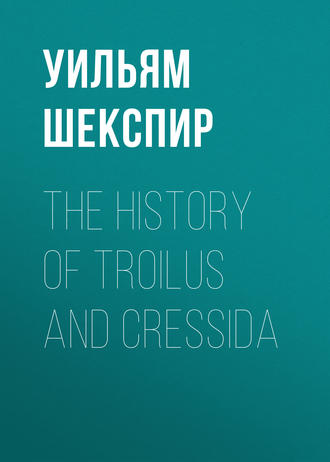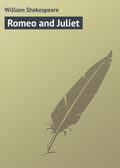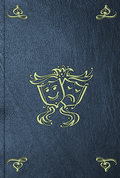полная версия

Уильям Шекспир
The History of Troilus and Cressida
ACT V. SCENE 1. The Grecian camp. Before the tent of ACHILLES
Enter ACHILLES and PATROCLUS
ACHILLES. I'll heat his blood with Greekish wine to-night,
Which with my scimitar I'll cool to-morrow.
Patroclus, let us feast him to the height.
PATROCLUS. Here comes Thersites.
Enter THERSITES
ACHILLES. How now, thou core of envy!
Thou crusty batch of nature, what's the news?
THERSITES. Why, thou picture of what thou seemest, and idol of
idiot worshippers, here's a letter for thee.
ACHILLES. From whence, fragment?
THERSITES. Why, thou full dish of fool, from Troy.
PATROCLUS. Who keeps the tent now?
THERSITES. The surgeon's box or the patient's wound.
PATROCLUS. Well said, Adversity! and what needs these tricks?
THERSITES. Prithee, be silent, boy; I profit not by thy talk;
thou
art said to be Achilles' male varlet.
PATROCLUS. Male varlet, you rogue! What's that?
THERSITES. Why, his masculine whore. Now, the rotten diseases
of
the south, the guts-griping ruptures, catarrhs, loads o'
gravel
in the back, lethargies, cold palsies, raw eyes, dirt-rotten
livers, wheezing lungs, bladders full of imposthume,
sciaticas,
limekilns i' th' palm, incurable bone-ache, and the rivelled
fee-
simple of the tetter, take and take again such preposterous
discoveries!
PATROCLUS. Why, thou damnable box of envy, thou, what meanest
thou
to curse thus?
THERSITES. Do I curse thee?
PATROCLUS. Why, no, you ruinous butt; you whoreson
indistinguishable cur, no.
THERSITES. No! Why art thou, then, exasperate, thou idle
immaterial
skein of sleid silk, thou green sarcenet flap for a sore eye,
thou tassel of a prodigal's purse, thou? Ah, how the poor
world is
pest'red with such water-flies-diminutives of nature!
PATROCLUS. Out, gall!
THERSITES. Finch egg!
ACHILLES. My sweet Patroclus, I am thwarted quite
From my great purpose in to-morrow's battle.
Here is a letter from Queen Hecuba,
A token from her daughter, my fair love,
Both taxing me and gaging me to keep
An oath that I have sworn. I will not break it.
Fall Greeks; fail fame; honour or go or stay;
My major vow lies here, this I'll obey.
Come, come, Thersites, help to trim my tent;
This night in banqueting must all be spent.
Away, Patroclus! Exit with
PATROCLUS
THERSITES. With too much blood and too little brain these two
may
run mad; but, if with too much brain and to little blood they
do,
I'll be a curer of madmen. Here's Agamemnon, an honest fellow
enough, and one that loves quails, but he has not so much
brain
as ear-wax; and the goodly transformation of Jupiter there,
his
brother, the bull, the primitive statue and oblique memorial
of
cuckolds, a thrifty shoeing-horn in a chain, hanging at his
brother's leg-to what form but that he is, should wit larded
with
malice, and malice forced with wit, turn him to? To an ass,
were
nothing: he is both ass and ox. To an ox, were nothing: he is
both
ox and ass. To be a dog, a mule, a cat, a fitchew, a toad, a
lizard, an owl, a put-tock, or a herring without a roe, I
would
not care; but to be Menelaus, I would conspire against
destiny.
Ask me not what I would be, if I were not Thersites; for I
care
not to be the louse of a lazar, so I were not Menelaus.
Hey-day!
sprites and fires!
Enter HECTOR, TROILUS, AJAX, AGAMEMNON, ULYSSES, NESTOR, MENELAUS, and DIOMEDES, with lights
AGAMEMNON. We go wrong, we go wrong.
AJAX. No, yonder 'tis;
There, where we see the lights.
HECTOR. I trouble you.
AJAX. No, not a whit.
Re-enter ACHILLES
ULYSSES. Here comes himself to guide you.
ACHILLES. Welcome, brave Hector; welcome, Princes all.
AGAMEMNON. So now, fair Prince of Troy, I bid good night;
Ajax commands the guard to tend on you.
HECTOR. Thanks, and good night to the Greeks' general.
MENELAUS. Good night, my lord.
HECTOR. Good night, sweet Lord Menelaus.
THERSITES. Sweet draught! 'Sweet' quoth 'a?
Sweet sink, sweet sewer!
ACHILLES. Good night and welcome, both at once, to those
That go or tarry.
AGAMEMNON. Good night.
Exeunt AGAMEMNON and MENELAUS
ACHILLES. Old Nestor tarries; and you too, Diomed,
Keep Hector company an hour or two.
DIOMEDES. I cannot, lord; I have important business,
The tide whereof is now. Good night, great Hector.
HECTOR. Give me your hand.
ULYSSES. [Aside to TROILUS] Follow his torch; he goes to
Calchas' tent; I'll keep you company.
TROILUS. Sweet sir, you honour me.
HECTOR. And so, good night.
Exit DIOMEDES; ULYSSES and TROILUS following
ACHILLES. Come, come, enter my tent.
Exeunt all but THERSITES
THERSITES. That same Diomed's a false-hearted rogue, a most
unjust
knave; I will no more trust him when he leers than I will a
serpent when he hisses. He will spend his mouth and promise,
like
Brabbler the hound; but when he performs, astronomers
foretell
it: it is prodigious, there will come some change; the sun
borrows of the moon when Diomed keeps his word. I will rather
leave to see Hector than not to dog him. They say he keeps a
Troyan drab, and uses the traitor Calchas' tent. I'll after.
Nothing but lechery! All incontinent varlets!
Exit
ACT V. SCENE 2. The Grecian camp. Before CALCHAS' tent
Enter DIOMEDES
DIOMEDES. What, are you up here, ho? Speak.
CALCHAS. [Within] Who calls?
DIOMEDES. Diomed. Calchas, I think. Where's your daughter?
CALCHAS. [Within] She comes to you.
Enter TROILUS and ULYSSES, at a distance; after them THERSITES
ULYSSES. Stand where the torch may not discover us.
Enter CRESSIDA
TROILUS. Cressid comes forth to him.
DIOMEDES. How now, my charge!
CRESSIDA. Now, my sweet guardian! Hark, a word with you.
[Whispers]
TROILUS. Yea, so familiar!
ULYSSES. She will sing any man at first sight.
THERSITES. And any man may sing her, if he can take her cliff;
she's noted.
DIOMEDES. Will you remember?
CRESSIDA. Remember? Yes.
DIOMEDES. Nay, but do, then;
And let your mind be coupled with your words.
TROILUS. What shall she remember?
ULYSSES. List!
CRESSIDA. Sweet honey Greek, tempt me no more to folly.
THERSITES. Roguery!
DIOMEDES. Nay, then-
CRESSIDA. I'll tell you what-
DIOMEDES. Fo, fo! come, tell a pin; you are a forsworn-
CRESSIDA. In faith, I cannot. What would you have me do?
THERSITES. A juggling trick, to be secretly open.
DIOMEDES. What did you swear you would bestow on me?
CRESSIDA. I prithee, do not hold me to mine oath;
Bid me do anything but that, sweet Greek.
DIOMEDES. Good night.
TROILUS. Hold, patience!
ULYSSES. How now, Troyan!
CRESSIDA. Diomed!
DIOMEDES. No, no, good night; I'll be your fool no more.
TROILUS. Thy better must.
CRESSIDA. Hark! a word in your ear.
TROILUS. O plague and madness!
ULYSSES. You are moved, Prince; let us depart, I pray,
Lest your displeasure should enlarge itself
To wrathful terms. This place is dangerous;
The time right deadly; I beseech you, go.
TROILUS. Behold, I pray you.
ULYSSES. Nay, good my lord, go off;
You flow to great distraction; come, my lord.
TROILUS. I prithee stay.
ULYSSES. You have not patience; come.
TROILUS. I pray you, stay; by hell and all hell's torments,
I will not speak a word.
DIOMEDES. And so, good night.
CRESSIDA. Nay, but you part in anger.
TROILUS. Doth that grieve thee? O withered truth!
ULYSSES. How now, my lord?
TROILUS. By Jove, I will be patient.
CRESSIDA. Guardian! Why, Greek!
DIOMEDES. Fo, fo! adieu! you palter.
CRESSIDA. In faith, I do not. Come hither once again.
ULYSSES. You shake, my lord, at something; will you go?
You will break out.
TROILUS. She strokes his cheek.
ULYSSES. Come, come.
TROILUS. Nay, stay; by Jove, I will not speak a word:
There is between my will and all offences
A guard of patience. Stay a little while.
THERSITES. How the devil luxury, with his fat rump and potato
finger, tickles these together! Fry, lechery, fry!
DIOMEDES. But will you, then?
CRESSIDA. In faith, I will, lo; never trust me else.
DIOMEDES. Give me some token for the surety of it.
CRESSIDA. I'll fetch you one.
Exit
ULYSSES. You have sworn patience.
TROILUS. Fear me not, my lord;
I will not be myself, nor have cognition
Of what I feel. I am all patience.
Re-enter CRESSIDA
THERSITES. Now the pledge; now, now, now!
CRESSIDA. Here, Diomed, keep this sleeve.
TROILUS. O beauty! where is thy faith?
ULYSSES. My lord!
TROILUS. I will be patient; outwardly I will.
CRESSIDA. You look upon that sleeve; behold it well.
He lov'd me-O false wench! – Give't me again.
DIOMEDES. Whose was't?
CRESSIDA. It is no matter, now I ha't again.
I will not meet with you to-morrow night.
I prithee, Diomed, visit me no more.
THERSITES. Now she sharpens. Well said, whetstone.
DIOMEDES. I shall have it.
CRESSIDA. What, this?
DIOMEDES. Ay, that.
CRESSIDA. O all you gods! O pretty, pretty pledge!
Thy master now lies thinking on his bed
Of thee and me, and sighs, and takes my glove,
And gives memorial dainty kisses to it,
As I kiss thee. Nay, do not snatch it from me;
He that takes that doth take my heart withal.
DIOMEDES. I had your heart before; this follows it.
TROILUS. I did swear patience.
CRESSIDA. You shall not have it, Diomed; faith, you shall not;
I'll give you something else.
DIOMEDES. I will have this. Whose was it?
CRESSIDA. It is no matter.
DIOMEDES. Come, tell me whose it was.
CRESSIDA. 'Twas one's that lov'd me better than you will.
But, now you have it, take it.
DIOMEDES. Whose was it?
CRESSIDA. By all Diana's waiting women yond,
And by herself, I will not tell you whose.
DIOMEDES. To-morrow will I wear it on my helm,
And grieve his spirit that dares not challenge it.
TROILUS. Wert thou the devil and wor'st it on thy horn,
It should be challeng'd.
CRESSIDA. Well, well, 'tis done, 'tis past; and yet it is not;
I will not keep my word.
DIOMEDES. Why, then farewell;
Thou never shalt mock Diomed again.
CRESSIDA. You shall not go. One cannot speak a word
But it straight starts you.
DIOMEDES. I do not like this fooling.
THERSITES. Nor I, by Pluto; but that that likes not you
Pleases me best.
DIOMEDES. What, shall I come? The hour-
CRESSIDA. Ay, come-O Jove! Do come. I shall be plagu'd.
DIOMEDES. Farewell till then.
CRESSIDA. Good night. I prithee come. Exit
DIOMEDES
Troilus, farewell! One eye yet looks on thee;
But with my heart the other eye doth see.
Ah, poor our sex! this fault in us I find,
The error of our eye directs our mind.
What error leads must err; O, then conclude,
Minds sway'd by eyes are full of turpitude.
Exit
THERSITES. A proof of strength she could not publish more,
Unless she said 'My mind is now turn'd whore.'
ULYSSES. All's done, my lord.
TROILUS. It is.
ULYSSES. Why stay we, then?
TROILUS. To make a recordation to my soul
Of every syllable that here was spoke.
But if I tell how these two did coact,
Shall I not lie in publishing a truth?
Sith yet there is a credence in my heart,
An esperance so obstinately strong,
That doth invert th' attest of eyes and ears;
As if those organs had deceptious functions
Created only to calumniate.
Was Cressid here?
ULYSSES. I cannot conjure, Troyan.
TROILUS. She was not, sure.
ULYSSES. Most sure she was.
TROILUS. Why, my negation hath no taste of madness.
ULYSSES. Nor mine, my lord. Cressid was here but now.
TROILUS. Let it not be believ'd for womanhood.
Think, we had mothers; do not give advantage
To stubborn critics, apt, without a theme,
For depravation, to square the general sex
By Cressid's rule. Rather think this not Cressid.
ULYSSES. What hath she done, Prince, that can soil our mothers?
TROILUS. Nothing at all, unless that this were she.
THERSITES. Will 'a swagger himself out on's own eyes?
TROILUS. This she? No; this is Diomed's Cressida.
If beauty have a soul, this is not she;
If souls guide vows, if vows be sanctimonies,
If sanctimony be the god's delight,
If there be rule in unity itself,
This was not she. O madness of discourse,
That cause sets up with and against itself!
Bifold authority! where reason can revolt
Without perdition, and loss assume all reason
Without revolt: this is, and is not, Cressid.
Within my soul there doth conduce a fight
Of this strange nature, that a thing inseparate
Divides more wider than the sky and earth;
And yet the spacious breadth of this division
Admits no orifex for a point as subtle
As Ariachne's broken woof to enter.
Instance, O instance! strong as Pluto's gates:
Cressid is mine, tied with the bonds of heaven.
Instance, O instance! strong as heaven itself:
The bonds of heaven are slipp'd, dissolv'd, and loos'd;
And with another knot, five-finger-tied,
The fractions of her faith, orts of her love,
The fragments, scraps, the bits, and greasy relics
Of her o'er-eaten faith, are bound to Diomed.
ULYSSES. May worthy Troilus be half-attach'd
With that which here his passion doth express?
TROILUS. Ay, Greek; and that shall be divulged well
In characters as red as Mars his heart
Inflam'd with Venus. Never did young man fancy
With so eternal and so fix'd a soul.
Hark, Greek: as much as I do Cressid love,
So much by weight hate I her Diomed.
That sleeve is mine that he'll bear on his helm;
Were it a casque compos'd by Vulcan's skill
My sword should bite it. Not the dreadful spout
Which shipmen do the hurricano call,
Constring'd in mass by the almighty sun,
Shall dizzy with more clamour Neptune's ear
In his descent than shall my prompted sword
Falling on Diomed.
THERSITES. He'll tickle it for his concupy.
TROILUS. O Cressid! O false Cressid! false, false, false!
Let all untruths stand by thy stained name,
And they'll seem glorious.
ULYSSES. O, contain yourself;
Your passion draws ears hither.
Enter AENEAS
AENEAS. I have been seeking you this hour, my lord.
Hector, by this, is arming him in Troy;
Ajax, your guard, stays to conduct you home.
TROILUS. Have with you, Prince. My courteous lord, adieu.
Fairwell, revolted fair! – and, Diomed,
Stand fast and wear a castle on thy head.
ULYSSES. I'll bring you to the gates.
TROILUS. Accept distracted thanks.
Exeunt TROILUS, AENEAS. and ULYSSES
THERSITES. Would I could meet that rogue Diomed! I would croak
like
a raven; I would bode, I would bode. Patroclus will give me
anything for the intelligence of this whore; the parrot will
not
do more for an almond than he for a commodious drab. Lechery,
lechery! Still wars and lechery! Nothing else holds fashion.
A
burning devil take them!
Exit
ACT V. SCENE 3. Troy. Before PRIAM'S palace
Enter HECTOR and ANDROMACHE
ANDROMACHE. When was my lord so much ungently temper'd
To stop his ears against admonishment?
Unarm, unarm, and do not fight to-day.
HECTOR. You train me to offend you; get you in.
By all the everlasting gods, I'll go.
ANDROMACHE. My dreams will, sure, prove ominous to the day.
HECTOR. No more, I say.
Enter CASSANDRA
CASSANDRA. Where is my brother Hector?
ANDROMACHE. Here, sister, arm'd, and bloody in intent.
Consort with me in loud and dear petition,
Pursue we him on knees; for I have dreamt
Of bloody turbulence, and this whole night
Hath nothing been but shapes and forms of slaughter.
CASSANDRA. O, 'tis true!
HECTOR. Ho! bid my trumpet sound.
CASSANDRA. No notes of sally, for the heavens, sweet brother!
HECTOR. Be gone, I say. The gods have heard me swear.
CASSANDRA. The gods are deaf to hot and peevish vows;
They are polluted off'rings, more abhorr'd
Than spotted livers in the sacrifice.
ANDROMACHE. O, be persuaded! Do not count it holy
To hurt by being just. It is as lawful,
For we would give much, to use violent thefts
And rob in the behalf of charity.
CASSANDRA. It is the purpose that makes strong the vow;
But vows to every purpose must not hold.
Unarm, sweet Hector.
HECTOR. Hold you still, I say.
Mine honour keeps the weather of my fate.
Life every man holds dear; but the dear man
Holds honour far more precious dear than life.
Enter TROILUS
How now, young man! Mean'st thou to fight to-day?
ANDROMACHE. Cassandra, call my father to persuade.
Exit CASSANDRA
HECTOR. No, faith, young Troilus; doff thy harness, youth;
I am to-day i' th' vein of chivalry.
Let grow thy sinews till their knots be strong,
And tempt not yet the brushes of the war.
Unarm thee, go; and doubt thou not, brave boy,
I'll stand to-day for thee and me and Troy.
TROILUS. Brother, you have a vice of mercy in you
Which better fits a lion than a man.
HECTOR. What vice is that, good Troilus?
Chide me for it.
TROILUS. When many times the captive Grecian falls,
Even in the fan and wind of your fair sword,
You bid them rise and live.
HECTOR. O, 'tis fair play!
TROILUS. Fool's play, by heaven, Hector.
HECTOR. How now! how now!
TROILUS. For th' love of all the gods,
Let's leave the hermit Pity with our mother;
And when we have our armours buckled on,
The venom'd vengeance ride upon our swords,
Spur them to ruthful work, rein them from ruth!
HECTOR. Fie, savage, fie!
TROILUS. Hector, then 'tis wars.
HECTOR. Troilus, I would not have you fight to-day.
TROILUS. Who should withhold me?
Not fate, obedience, nor the hand of Mars
Beck'ning with fiery truncheon my retire;
Not Priamus and Hecuba on knees,
Their eyes o'ergalled with recourse of tears;
Nor you, my brother, with your true sword drawn,
Oppos'd to hinder me, should stop my way,
But by my ruin.
Re-enter CASSANDRA, with PRIAM
CASSANDRA. Lay hold upon him, Priam, hold him fast;
He is thy crutch; now if thou lose thy stay,
Thou on him leaning, and all Troy on thee,
Fall all together.
PRIAM. Come, Hector, come, go back.
Thy wife hath dreamt; thy mother hath had visions;
Cassandra doth foresee; and I myself
Am like a prophet suddenly enrapt
To tell thee that this day is ominous.
Therefore, come back.
HECTOR. Aeneas is a-field;
And I do stand engag'd to many Greeks,
Even in the faith of valour, to appear
This morning to them.
PRIAM. Ay, but thou shalt not go.
HECTOR. I must not break my faith.
You know me dutiful; therefore, dear sir,
Let me not shame respect; but give me leave
To take that course by your consent and voice
Which you do here forbid me, royal Priam.
CASSANDRA. O Priam, yield not to him!
ANDROMACHE. Do not, dear father.
HECTOR. Andromache, I am offended with you.
Upon the love you bear me, get you in.
Exit ANDROMACHE
TROILUS. This foolish, dreaming, superstitious girl
Makes all these bodements.
CASSANDRA. O, farewell, dear Hector!
Look how thou diest. Look how thy eye turns pale.
Look how thy wounds do bleed at many vents.
Hark how Troy roars; how Hecuba cries out;
How poor Andromache shrills her dolours forth;
Behold distraction, frenzy, and amazement,
Like witless antics, one another meet,
And all cry, Hector! Hector's dead! O Hector!
TROILUS. Away, away!
CASSANDRA. Farewell! – yet, soft! Hector, I take my leave.
Thou dost thyself and all our Troy deceive.
Exit
HECTOR. You are amaz'd, my liege, at her exclaim.
Go in, and cheer the town; we'll forth, and fight,
Do deeds worth praise and tell you them at night.
PRIAM. Farewell. The gods with safety stand about thee!
Exeunt severally PRIAM and HECTOR
Alarums
TROILUS. They are at it, hark! Proud Diomed, believe,
I come to lose my arm or win my sleeve.
Enter PANDARUS
PANDARUS. Do you hear, my lord? Do you hear?
TROILUS. What now?
PANDARUS. Here's a letter come from yond poor girl.
TROILUS. Let me read.
PANDARUS. A whoreson tisick, a whoreson rascally tisick so
troubles
me, and the foolish fortune of this girl, and what one thing,
what another, that I shall leave you one o' th's days; and I
have
a rheum in mine eyes too, and such an ache in my bones that
unless a man were curs'd I cannot tell what to think on't.
What
says she there?
TROILUS. Words, words, mere words, no matter from the heart;
Th' effect doth operate another way.
[Tearing the
letter]
Go, wind, to wind, there turn and change together.
My love with words and errors still she feeds,
But edifies another with her deeds. Exeunt
severally






